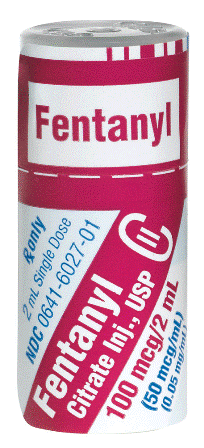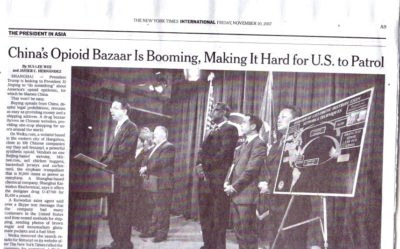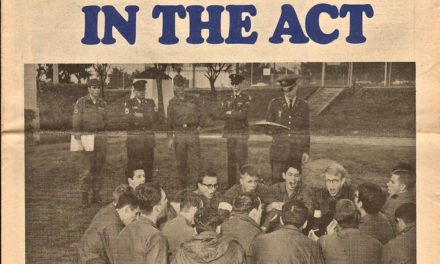Sometimes you have to admire the audacity of politicians who direct the attention of the masses away from the real causes of our problems. Let’s also tip our hat to the journalists and PR specialists who keep Johnson & Johnson’s name out of stories about Fentanyl. (J&J has been making and selling the powerful synthetic opiate in the US since 1961, when it acquired Jannsen.)
Last week President Trump complained —and the New York Times pseudo-substantiated— that Chinese companies selling fentanyl online are causal factors in the US opiate epidemic. “Despite Trump’s Pleas, China’s Opioid Bazaar is Booming,” was the headline on a Nov. 8 article by Sui-Lee Wee and Javier C. Hernandez. The page-wide print edition headline (below) was a slight variation on the US-as-victim theme:
The article, which credits three additional reporters for contributing research, begins:
“President Trump is looking to President Xi Jinping to ‘do something’ about America’s opioid epidemic, for which he blames China.
“That won’t be easy.
“Buying opioids from China, despite legal prohibitions, remains as easy as providing money and a shipping address. A drug bazaar thrives on Chinese websites, providing one-stop shopping for users around the world.
“On Weiku.com, a website based in the eastern city of Hangzhou, close to 100 Chinese companies say they sell fentanyl, a powerful synthetic opioid…”
The Times’ team contacted Chinese manufacturers of fentanyl analogues and precursors, some of whom were forthcoming (apparently assuming their operations were legal). But,
“Both Cinri and Changhong declined to provide phone numbers. When asked for comment, the Cinri representative responded over Skype text with the Russian word for imbecile and went silent.”
The Times and the Trump Administration are in perfect sync on the fentanyl issue —Bad China, Good US. Consider this line:
“In China, fentanyl makers are constantly finding new ways to evade detection.”
And this quote from a management consultant:
“As long as, in China, you can produce chemicals without serious supervision, the problem will persist.”
The Times reporters also protected the image of Great Britain with this odd sentence implying that opium addiction spreads like a virus:
“History textbooks and television shows widely depict how the country was ravaged by opium addiction in the 19th century, a major driver in the Opium Wars.”
The British Navy was the “major driver in the Opium wars,” imposing opium addiction on the Chinese people.
Expect the brilliant misdirection play to continue:
In a sign that the United States was taking its fight against opioids globally, the Department of Justice last month announced indictments against two Chinese men it accused of being major fentanyl traffickers…






